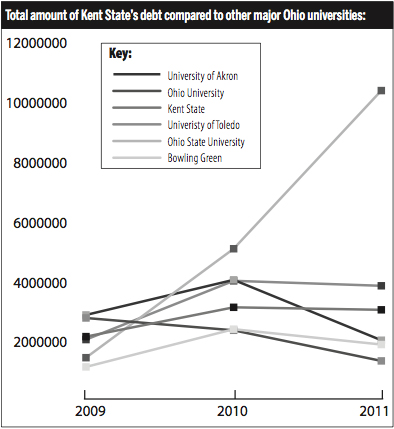Students can be sued for not making tuition payments

Kent State doesn’t let students graduate and forget about their remaining tuition payments. Ohio law permits the Ohio Attorney General’s Office to collect debts from students for up to 40 years after graduation, said Dan Tierney, spokesman for the office.
Kent State sent $2.98 million in “unpaid receivables” to the Ohio attorney general this year — just below last year’s $3.06 million. The accumulated debt since 2009 received by all Ohio universities totals more then $140 million.
If payments are between 12 and 18 months past due, Kent State sends the unpaid accounts to the Attorney General’s Office. The attorney general then decides what action is necessary to take against the students, said Don Boland, manager of collections and check distribution in the Bursar’s Office.
Why should I care?
Les Carter, Kent State bursar, said unpaid accounts contribute to tuition increase.
Students who do not pay their outstanding tuition can be sued by the state of Ohio.
Ohio law allows the attorney general to collect debt for up to 40 years after graduation.
Tierney said the money is obtained by suing students or by working with an outside collection agency.
“Section staff members will attempt to contact any debtor by phone and/or mail to arrange payment, which may include setting up a payment plan,” Tierney said.
Leslie Carter, Kent State bursar, said although the legal requirement of pursuing delinquent accounts is the main reason they do so, it also helps to avoid a tuition increase.
“If you collect an old debt, that helps you not have to charge more in the future,” he said. “It’s kind of a trade off — if everyone paid their debt we wouldn’t have to increase tuition in order to cover operating costs.”
Carter said before pursuing legal action, the attorney general will determine if the student has any assets.
“It’s senseless to really sue someone and they have no assets,” he said.
Boland said the university takes into consideration the financial situation of the student.
“As long as a student is making a minimal payment to (Kent State), or at least paying us monthly, we will not send the account to the Attorney General’s Office,” he said. “As long as they are making an attempt to pay monthly.”
Carter said Kent State works on accounts in the Bursar’s Office as well. He said after the third installment payment, they look at students who have unpaid balances and send them letters telling them to pay their balance by a certain date.
If students do not make a payment, Kent State may hold transcripts, hold registration or deregister a student, but the university does not hold diplomas.
“Mind you, we start with a list of like, 2,000 names, and we’ll get it down at the end to about 125-150 names for the Kent campus,” Carter said. He said the letters recommend students turn in their paperwork, sign promissory notes and check financial aid.
To release a hold on transcripts or registration, students must pay the balance either on the Web, have funds withdrawn from their bank account or send a check or money order to Kent State. They must then speak to a collections representative and holds will be released after payment.
Boland said once Kent State sends the accounts to the Attorney General’s Office, the university does not know what course of action is being taken.
If a student is sued, Carter said they try to recover the balance owed as well as any interest.
“That is all we can collect, really,” he said.
Tierney said the Attorney General’s Office retains its administrative fee, and additional fees if a third party collects the account.
Carter said he thinks the issue of suing students is more obvious in recent years because of the economy.
“If everyone was working and the economy wasn’t as bad then we probably wouldn’t see the lawsuits that we see,” he said.
Carter said they are willing to work with students, and that is their goal.
“All we are trying to do is recover an outstanding balance,” Carter said, “and we’re going to work with you as long as you show some effort as far as paying.”
Contact Caitlyn Callhan [email protected].


